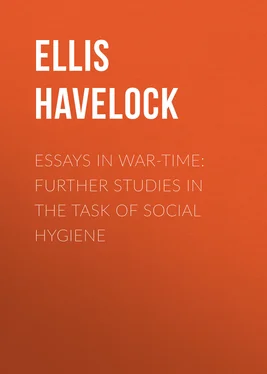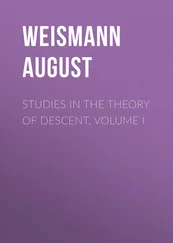Havelock Ellis - Essays in War-Time - Further Studies in the Task of Social Hygiene
Здесь есть возможность читать онлайн «Havelock Ellis - Essays in War-Time - Further Studies in the Task of Social Hygiene» — ознакомительный отрывок электронной книги совершенно бесплатно, а после прочтения отрывка купить полную версию. В некоторых случаях можно слушать аудио, скачать через торрент в формате fb2 и присутствует краткое содержание. Жанр: psy_sex_and_family, foreign_psychology, foreign_edu, на английском языке. Описание произведения, (предисловие) а так же отзывы посетителей доступны на портале библиотеки ЛибКат.
- Название:Essays in War-Time: Further Studies in the Task of Social Hygiene
- Автор:
- Жанр:
- Год:неизвестен
- ISBN:нет данных
- Рейтинг книги:5 / 5. Голосов: 1
-
Избранное:Добавить в избранное
- Отзывы:
-
Ваша оценка:
- 100
- 1
- 2
- 3
- 4
- 5
Essays in War-Time: Further Studies in the Task of Social Hygiene: краткое содержание, описание и аннотация
Предлагаем к чтению аннотацию, описание, краткое содержание или предисловие (зависит от того, что написал сам автор книги «Essays in War-Time: Further Studies in the Task of Social Hygiene»). Если вы не нашли необходимую информацию о книге — напишите в комментариях, мы постараемся отыскать её.
Essays in War-Time: Further Studies in the Task of Social Hygiene — читать онлайн ознакомительный отрывок
Ниже представлен текст книги, разбитый по страницам. Система сохранения места последней прочитанной страницы, позволяет с удобством читать онлайн бесплатно книгу «Essays in War-Time: Further Studies in the Task of Social Hygiene», без необходимости каждый раз заново искать на чём Вы остановились. Поставьте закладку, и сможете в любой момент перейти на страницу, на которой закончили чтение.
Интервал:
Закладка:
That little incident at Brandon, however, and indeed the whole picture of the ordinary English life of his time which Rous sets forth, suggest a wider reflection. We realise what has always been the English temper. It is the temper of a vigorous, independent, opinionated, free-spoken yet sometimes suspicious people among whom every individual feels in himself the impulse to rule. It is also the temper of a people always prepared in the face of danger to subordinate these native impulses. The one tendency and the other opposing tendency are alike based on the history and traditions of the race. Fifteen centuries ago, Sidonius Apollinaris gazed inquisitively at the Saxon barbarians, most ferocious of all foes, who came to Aquitania, with faces daubed with blue paint and hair pushed back over their foreheads; shy and awkward among the courtiers, free and turbulent when back again in their ships, they were all teaching and learning at once, and counted even shipwreck as good training. One would think, the Bishop remarks, that each oarsman was himself the arch-pirate. 1 1 O'Dalton, Letters of Sidonius , Vol. II., p. 149.
These were the men who so largely went to the making of the "Anglo-Saxon," and Sidonius might doubtless still utter the same comment could he observe their descendants in England to-day. Every Englishman believes in his heart, however modestly he may conceal the conviction, that he could himself organise as large an army as Kitchener and organise it better. But there is not only the instinct to order and to teach but also to learn and to obey. For every Englishman is the descendant of sailors, and even this island of Britain seemed to men of old like a great ship anchored in the sea. Nothing can overcome the impulse of the sailor to stand by his post at the moment of danger, and to play his sailorly part, whatever his individual convictions may be concerning the expedition to Rochelle or the expedition to the Dardanelles, or even concerning his right to play no part at all. That has ever been the Englishman's impulse in the hour of peril of his island Ship of State, as to-day we see illustrated in an almost miraculous degree. It is the saving grace of an obstinately independent and indisciplinable people.
Yet let us not forget that this same English temper is shown not only in warfare, not only in adventure in the physical world, but also in the greater, and—may we not say?—equally arduous tasks of peace. For to build up is even yet more difficult than to pull down, to create new life a still more difficult and complex task than to destroy it. Our English habits of restless adventure, of latent revolt subdued to the ends of law and order, of uncontrollable freedom and independence, are even more fruitful here, in the organisation of the progressive tasks of life, than they are in the organisation of the tasks of war.
That is the spirit in which these essays have been written by an Englishman of English stock in the narrowest sense, whose national and family instincts of independence and warfare have been transmuted into a preoccupation with the more constructive tasks of life. It is a spirit which may give to these little essays—mostly produced while war was in progress—a certain unity which was not designed when I wrote them.
II
EVOLUTION AND WAR
The Great War of to-day has rendered acute the question of the place of warfare in Nature and the effect of war on the human race. These have long been debated problems concerning which there is no complete agreement. But until we make up our minds on these fundamental questions we can gain no solid ground from which to face serenely, or at all events firmly, the crisis through which mankind is now passing.
It has been widely held that war has played an essential part in the evolutionary struggle for survival among our animal ancestors, that war has been a factor of the first importance in the social development of primitive human races, and that war always will be an essential method of preserving the human virtues even in the highest civilisation. It must be observed that these are three separate and quite distinct propositions. It is possible to accept one, or even two, of them without affirming them all. If we wish to clear our minds of confusion on this matter, so vital to our civilisation, we must face each of the questions by itself.
It has sometimes been maintained—never more energetically than to-day, especially among the nations which most eagerly entered the present conflict—that war is a biological necessity. War, we are told, is a manifestation of the "Struggle for Life"; it is the inevitable application to mankind of the Darwinian "law" of natural selection. There are, however, two capital and final objections to this view. On the one hand it is not supported by anything that Darwin himself said, and on the other hand it is denied as a fact by those authorities on natural history who speak with most knowledge. That Darwin regarded war as an insignificant or even non-existent part of natural selection must be clear to all who have read his books. He was careful to state that he used the term "struggle for existence" in a "metaphorical sense," and the dominant factors in the struggle for existence, as Darwin understood it, were natural suitability to the organic and inorganic environment and the capacity for adaptation to circumstances; one species flourishes while a less efficient species living alongside it languishes, yet they may never come in actual contact and there is nothing in the least approaching human warfare. The conditions much more resemble what, among ourselves, we may see in business, where the better equipped species, that is to say, the big capitalist, flourishes, while the less well equipped species, the small capitalist, succumbs. Mr. Chalmers Mitchell, Secretary of the London Zoological Society and familiar with the habits of animals, has lately emphasised the contention of Darwin and shown that even the most widely current notions of the extermination of one species by another have no foundation in fact. 2 2 P. Chalmers Mitchell, Evolution and the War , 1915.
Thus the thylacine or Tasmanian wolf, the fiercest of the marsupials, has been entirely driven out of Australia and its place taken by a later and higher animal, of the dog family, the dingo. But there is not the slightest reason to believe that the dingo ever made war on the thylacine. If there was any struggle at all it was a common struggle against the environment, in which the dingo, by superior intelligence in finding food and rearing young, and by greater resisting power to climate and disease, was able to succeed where the thylacine failed. Again, the supposed war of extermination waged in Europe by the brown rat against the black rat is (as Chalmers Mitchell points out) pure fiction. In England, where this war is said to have been ferociously waged, both rats exist and flourish, and under conditions which do not usually even bring them into competition with each other. The black rat ( Mus rattus ) is smaller than the other, but more active and a better climber; he is the rat of the barn and the granary. The brown or Norway rat ( Mus decumanus ) is larger but less active, a burrower rather than a climber, and though both rats are omnivorous the brown rat is more especially a scavenger; he is the rat of sewers and drains. The black rat came to Northern Europe first—both of them probably being Asiatic animals—and has no doubt been to some extent replaced by the brown rat, who has been specially favoured by the modern extension of drains and sewers, which exactly suit his peculiar tastes. But each flourishes in his own environment; neither of them is adapted to the other's environment; there is no war between them, nor any occasion for war, for they do not really come into competition with each other. The cockroaches, or "blackbeetles," furnish another example. These pests are comparatively modern and their great migrations in recent times are largely due to the activity of human commerce. There are three main species of cockroach—the Oriental, the American, and the German (or Croton bug)—and they flourish near together in many countries, though not with equal success, for while in England the Oriental is most prosperous, in America the German cockroach is most abundant. They are seldom found in actual association, each is best adapted to a particular environment; there is no reason to suppose that they fight. It is so throughout Nature. Animals may utilise other species as food; but that is true of even, the most peaceable and civilised human races. The struggle for existence means that one species is more favoured by circumstances than another species; there is not the remotest resemblance anywhere to human warfare.
Интервал:
Закладка:
Похожие книги на «Essays in War-Time: Further Studies in the Task of Social Hygiene»
Представляем Вашему вниманию похожие книги на «Essays in War-Time: Further Studies in the Task of Social Hygiene» списком для выбора. Мы отобрали схожую по названию и смыслу литературу в надежде предоставить читателям больше вариантов отыскать новые, интересные, ещё непрочитанные произведения.
Обсуждение, отзывы о книге «Essays in War-Time: Further Studies in the Task of Social Hygiene» и просто собственные мнения читателей. Оставьте ваши комментарии, напишите, что Вы думаете о произведении, его смысле или главных героях. Укажите что конкретно понравилось, а что нет, и почему Вы так считаете.












